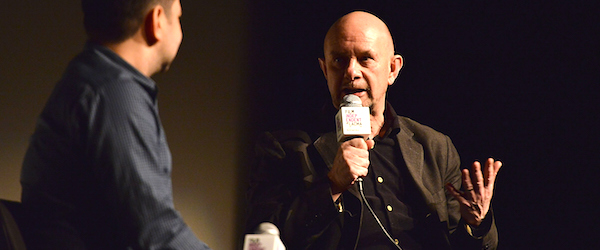He was nominated for the Academy Award for Best Adapted Screenplay for 2009’s An Education, adapted from a memoir by journalist Lynn Barber. Last year, his adaptation of Cheryl Strayed’s memoir Wild hit the screen and the film was nominated for two Oscars. His latest screenplay, Brooklyn, was adapted from Colm Toibin’s novel of the same name. The film follows a young Irish immigrant (played by Saorise Ronan) torn between the life she left behind and her new home in New York. At a recent Film Independent at LACMA screening of the film, Hornby talked a little bit about why adapting other writers’ work provides a nice respite from writing novels. “Each novel I’ve tried to write something different from the one before,” said Hornby. “To begin with, it feels different and then there always comes a point about halfway through the novel where you think, ‘Oh God! It’s me again!’” Hornby said the realization reminds him of the climactic scene from The Truman Show (1998). “I’m rowing out to sea, rowing out to sea thinking, ‘This is brilliant. I’m brilliant. I have a great imagination,’” said Hornby, imaginary oars in hand, “And then I clunk against the inside of my own head like Jim Carrey clunks against the sky.” “With Wild and An Education and Brooklyn, I think, ‘Oh, I could never have thought of these characters, these situations.’ But I get to dramatize and I get to mess around a bit and maybe put some of my voice in there. It’s completely fresh and I love doing it.”
Hornby’s first screenplay was actually adapted from his own work. His memoir Fever Pitch, published in 1992, was optioned by the British television station Film4 and Hornby was hired to write the screenplay. The 1995 romantic comedy starred Colin Firth as a diehard soccer fan. Hornby said he didn’t anticipate that his work would ever be optioned again. “I wrote High Fidelity. It got optioned pretty quickly. And I thought, ‘Okay, this might happen again, but do I want to spend three years writing a book and then the next five years taking out two thirds of the words that I’ve written in the previous three years?’” Hornby decided then and there that if he was going to adapt books into screenplays, he’d rather tackle something fresh and new than live with his own characters for eight years. In the case of Brooklyn, Toibin, the author himself, requested that Hornby adapt his book. When Hornby was asked if that request put even more pressure on him to deliver, he said that sometimes the length of time it takes to get a movie made can take the pressure off. “One of the beautiful things about the horrible, problematic nature of making movies is that there are so many obstacles that if you fall at one of the early ones, then actually all the pressure’s taken away,” said Hornby. “The pressure only comes when you’ve jumped over so many hurdles that you have a room full of people finally being in the position to judge the movie against the book. And so I feel the pressure now more than I felt when I was writing.” Hornby said that the tedious process of making a film—from finding financing to attaching talent—provided them with another unexpected advantage. “When I began writing Brooklyn, Saorise was 16.” Hornby said he and the producers were aware of her work on Atonement, but weren’t considering her for a role that involved sex and dating and marriage. “And one of the beautiful, karmic things that happened is that this film took so long to get together…that Saorise was just there getting older and older and older.” “There is nobody else in the world who could have done what she did,” said Hornby. “I cursed every day of those five years and then I saw the first cut and I thought, ‘Oh God. We had to wait.’” Hornby said seeing the work of so many talented actors and craftspeople on the screen is perhaps the chief pleasure of working in film. “One of the really great things about working in movies, as opposed to working in books, is that it’s possible to sit in a movie audience and look at it and think, ‘Bloody hell, that’s good.’ I could never read a page of one of my books and think ‘Bloody hell, that’s good.’ I think, ‘Oh god. Ew, god,’ like that.” “But [with movies] I can leave the script out of it and just marvel at that cast and what [director] John [Crowley] brought to it with the performances and what [cinematographer] Yves [Bélanger] brought to it with the look of the film and the beautiful score and just feel that somehow I have been involved in something that has real magic to it.” Brooklyn is now playing in select theaters.
Tom Sveen / Film Independent Blogger
